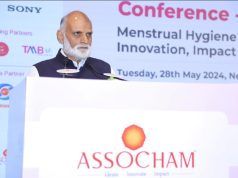The real propaganda of the menstrual hygiene movement
The menstrual hygiene cause promises women and teenage girls a better life by endorsing sanitary ware that will allow them to take part in social activities and have more confidence. However, in a market-driven economy, where the main motive of the producers is to maximize profit, the motives of the CSR and social campaigns for menstrual hygiene management – backed by these same manufacturers – can be easily predicted: nothing more than the maximization of profit.
Globally, the feminine hygiene product market is expected to be worth over $36 billion (approximately INR 2.40 lakh crore) over the next six years. This market in India has been growing steadily and is already worth INR 2,200 crores today, which puts into perspective the motivation of the manufacturing corporations backing this propaganda.
Kavita Wankhade, Senior Lead – Practice, Indian Institute for Human Settlements (IIHS) says, “There is a trend today to promote particular kind of menstrual hygiene products. But we need to remember that women bodies are their own, and they have a right to choose what to use. Informed choice must underline all MHM programs- enabling access to multiple products, and also providing women with sufficient information regarding MHM.”
Effects on the environment
The negativity portrayed in sanitary pad ads and the invention of new sanitary products has led women to take steps against menstruation, for example, the use of cycle-stopping pills. The manufacturers of these pills claim that taken daily, it can halt a woman’s menstrual periods indefinitely, as well as prevent pregnancies.
The critics, on the other hand, argue that the same hormones that work on the menstrual cycles act in the brain, bones and the skin. The human body is a complex machine with all its parts and processes intertwined. If one were to alter one part or process, other parts get affected as well. It is true that birth control pills are effective in controlling pregnancy, but the hormones can cause adverse effects on other parts of the body. Women cannot be blamed for choosing harmful methods, because it is the feminine hygiene industry that encourages menstrual taboos.
“A woman is regarded as an untouchable when she is menstruating in many parts of India and the need of the hour is to start educating girls on menstrual hygiene awareness,” says Women Health Campaigner Natalia Vodianova, who is also the Co-founder of Elbi India, India’s first philanthropic rewards-based subscription service and a member of the President of the UN General Assembly’s Advisory Group on gender equality.

It’s a year since India scrapped the controversial 12% tax on women’s sanitary napkins, yet a small section of the 31-crore menstruating women (as per the 2011 census), are able to use it. About 55% of women complain of allergies, rashes, and yeast infections while using sanitary napkins because of chemicals used in the products on offer. In rare cases, chemicals especially chlorine, used to bleach the napkins, can cause ovarian cancer and endometrial disorders.
In addition to harming women, feminine hygiene products are harming the environment as well. A major concern nowadays is the environmental devastation brought on by the use of commercial, non-biodegradable, disposable sanitary napkins and tampons. They are made for one-time use only by manufacturers, in order to lure women into the convenience of their products. Since they are disposable, they are released in large numbers into the environment.
Creation of sustainable MHM ecosystem with menstrual waste disposal facilities is another major barrier for improving MHM in India. Reports suggest that India creates staggering 113,000 tonnes of menstrual waste annually that can take over 250 years to fully decompose. Lack of proper disposal facilities also leads to overuse of the menstrual hygiene products beyond the recommended time which puts women at the risk for infections. Lack of MHM facilities in schools affects the employability of the girls as 23 million of them drop out of school annually due to lack of proper MHM facilities.
These products contribute to both land and water pollution during their production and after their use. Not only does the production process generate contaminated wastewater, but also pads, tampons and their packaging clog landfills, sewers, and treatment plants. So much for society’s effort to keep the phenomenon of menstruation out of sight!
What are the alternatives?
One of the ways women can be more comfortable about menstruation is by celebrating the onset of menarche. One bet hands-down is that if men had periods, they would celebrate the occurrence. The reason is that men celebrate almost everything associated with them.
Since menstruation is crucial for life processes, why should women hate and have a sense of disgust towards their own bodies due to menstruation? One of the steps in liberating women from this dual oppression is to unlearn the shame, resist the corporate brainwashing, and, literally, get our hands dirty learning how our bodies work.
This article appeared in the print magazine of The CSR Journal.












